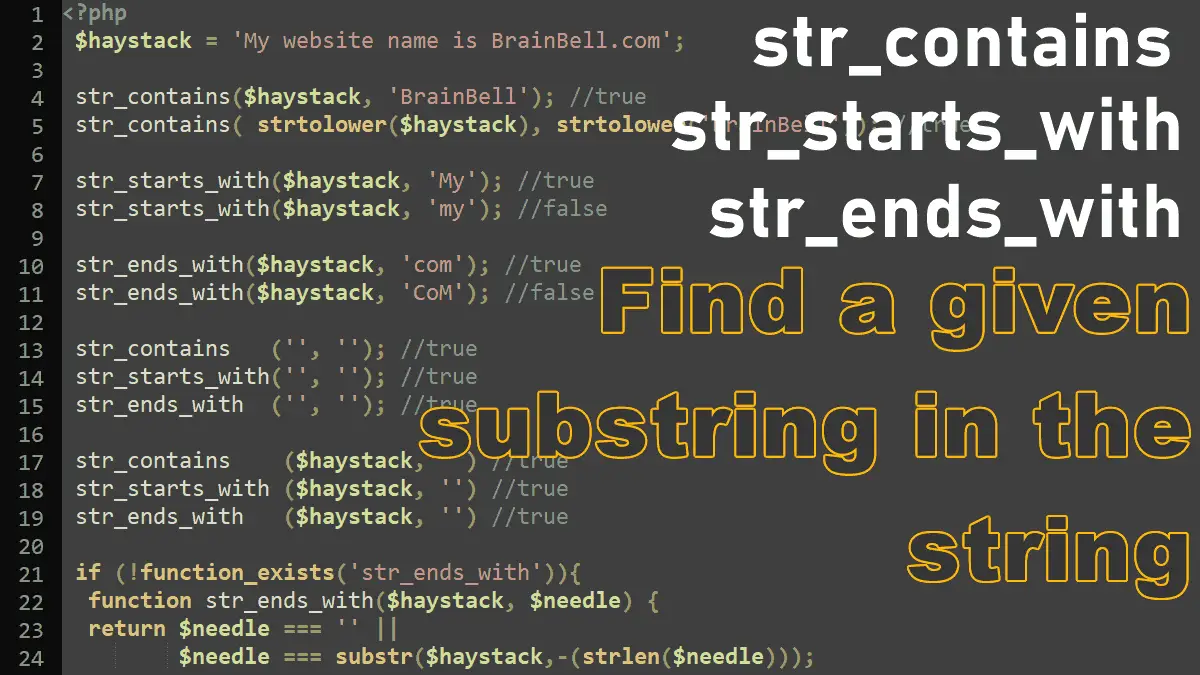- str_contains: Check if a string contains a given substring
- str_starts_with: Checks if a string starts with a given substring
- str_ends_with: Checks if a string ends with a given substring
Note: These functions are available from PHP 8 onwards, see related functions for previous versions here: Working with Substrings.
str_contains: Check if a string contains a substring
<?php //Syntax str_contains(string $haystack, string $needle): bool
The str_contains function was introduced in PHP 8, prior to PHP 8 there was not a specific PHP function that tells you whether or not a given substring exists within a string, coders mostly used the strpos() function to determine whether a substring exists in the string or not. The str_contains function accepts two arguments:
$haystackthe string to search in and$needlethe substring to search for in the haystack.
This function returns true if the given string $needle is available in the $haystack string and returns false if the $needle is not found in the $haystack string.
<?php $haystack = 'My website name is BrainBell.com'; $needle = 'BrainBell'; $exist = str_contains($haystack, $needle); if ($exist) echo 'The word "BrainBell" availble in $haystack'; else echo 'Not found'; //Prints: The word "BrainBell" availble in $haystack
Example: This function is case-sensitive, so the following example returns false:
<?php
if (str_contains('BrainBell.com', 'brainbell'))
echo 'The word "BrainBell" availble in $haystack';
else
echo 'Not found';
//Prints: Not found
Example: Empty stirng
PHP 8 considers that an empty substring exists at every position in a string, so checking an empty string with str_contains() will always return true. See the following code:
<?php
//true
if (str_contains('', ''));
echo 'both haystack and needle are empty';
//true
if (str_contains('BrainBell.com', ''))
echo 'haystack contains an empty substring';
Example: Create str_contains() function for older versions of PHP
If you are writing a script that contains the str_contains() function and you want to ensure that your code must run on versions prior to PHP 8 then create your own str_contains() function:
<?php
if (!function_exists('str_contains')){
function str_contains($haystack, $needle) {
return $needle === '' || strpos($haystack,$needle) !== false;
}}
str_starts_with: Check if a string starts with a specific substring
<?php //Syntax str_starts_with(string $haystack, string $needle): bool
The str_starts_with function works similar to the str_contains function but its searches for the substring $needle from the beginning of the string $haystack.
<?php $haystack = 'My website name is BrainBell.com'; $needle = 'My website'; //true if (str_starts_with ($haystack, $needle)) echo 'Found'; //Prints: Found
Example: Empty stirng
Similar to str_contains function, this function is also case-sensitive and always returns true when searching an empty substring.
<?php
//Always prints
if (str_starts_with('', ''))
echo 'both haystack and needle are empty';
//Always prints
if (str_starts_with('BrainBell.com', ''))
echo 'BrainBell.com starts with an empty substring';
Exmaple: str_starts_with() bckward compatibility with older PHP versions
In the example “Create str_contains() function for older versions of PHP” we created the str_contains() function for compatibility reasons. In following code we used the same technique to create the str_starts_with() function for older PHP versions:
<?php
if (!function_exists('str_starts_with')){
function str_starts_with($haystack, $needle) {
return $needle === '' || strpos($haystack,$needle) === 0;
}}
str_ends_with: Check if a string ends with a specific substring
<?php //Syntax str_ends_with(string $haystack, string $needle): bool
This function works similar to the str_starts_with and the str_contains functions, except that it searches for the substring $needle at the end of the string $haystack.
<?php
$haystack = 'My website name is BrainBell.com';
$needle = 'com';
//always prints
if (str_ends_with($haystack, $needle))
echo 'The $haystack string ends with "com" word';
//Case not match, never prints
if (str_ends_with($haystack, 'COM'))
echo 'The $haystack string ends with "com" word';
//always prints
if (str_ends_with('', ''))
echo 'both haystack and needle are empty';
//always prints
if (str_ends_with($haystack, ''))
echo 'needle is empty';
Example: str_ends_with backward compatibility
<?php
if (!function_exists('str_ends_with')){
function str_ends_with($haystack, $needle) {
return $needle === '' ||
$needle === substr($haystack,-(strlen($needle)));
}}
Perform case-insensitive check
The str_contains, str_starts_with, and str_ends_with functions are case-sensitive and their case-insensitive equivalent functions are not available. But you can perform a case-insensitive operation by lowering the case of both $haystack and $needle, see the following example:
<?php
$haystack = 'My website name is BrainBell.com';
$needle = 'Brainbell';
$exist = str_contains(
strtolower($haystack),
strtolower($needle)
);
var_dump($exist);
//bool(true)
Manipulating substrings:
